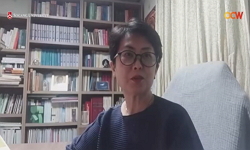The purpose of this study was to examine the naissance of Theological Anthropology, which explores theology with emphasis on humankind, based on time and ideological changes. In the latest 40 years, the Catholic theology gave birth to Theological Anth...
http://chineseinput.net/에서 pinyin(병음)방식으로 중국어를 변환할 수 있습니다.
변환된 중국어를 복사하여 사용하시면 됩니다.
- 中文 을 입력하시려면 zhongwen을 입력하시고 space를누르시면됩니다.
- 北京 을 입력하시려면 beijing을 입력하시고 space를 누르시면 됩니다.
https://www.riss.kr/link?id=A101885738
- 저자
- 발행기관
- 학술지명
- 권호사항
-
발행연도
2007
-
작성언어
Korean
- 주제어
-
KDC
230
-
등재정보
KCI등재
-
자료형태
학술저널
-
수록면
171-204(34쪽)
- 제공처
- 소장기관
-
0
상세조회 -
0
다운로드
부가정보
다국어 초록 (Multilingual Abstract)
Today, the Church can no longer talk about religion from the hierarchical perspective with the focus on God’s words, Fathers’ opinions, the Councils. It is necessary to deeply explore men and seek out for realistic experiences. With the growing ethnocentrism (Antropocentrismo), the Church found it important to study humankind for better understanding. Theological Anthropology was born in modern Europe’s conversion to ethnocentrism.
Karl Rahner(1904~1984) is the one who greatly contributed to the philosophical foundation of Theological Anthropology. Through him, anthropological studies become more organized and uniform within the realms of theology. Rahner first used the term ‘Theological Anthropology’ and established anthropological methodologies on a theological background.
The anthropological tendency of theology became official within the Catholic Church. The “2nd Vatican Council” was what made it official. The Pastoral Constitution (Gaudium et spes), established by the Councils, explained realistic experiences of men on the basis of Theological Anthropology.
The Catholic Church made effort to understand the conversion to ethnocentrism and boldly absorb its positive aspects. Such effort accomplished the academic development of Theological Anthropology. Theological Anthropology allowed the church to absorb ethnocentric trends and address it from academic perspectives. The naissance of Theological Anthropology reflects the inevitable needs that modern Catholic ideologies have to be man-centered and promote its teachings and studies for men.
The purpose of this study was to examine the naissance of Theological Anthropology, which explores theology with emphasis on humankind, based on time and ideological changes. In the latest 40 years, the Catholic theology gave birth to Theological Anthropology (Antropologia teologica) which generalizes the understanding of humankind on the basis of theology. Theology has studied humankind as a major topic, but the emergence of Theological Anthropology tells us that a more organized field of study on humankind and more professional studies and researches have become available. The convertsion of theology into a man-centered, anthropological theme was a major change to its God-centered and church-centered foundation.
Today, the Church can no longer talk about religion from the hierarchical perspective with the focus on God’s words, Fathers’ opinions, the Councils. It is necessary to deeply explore men and seek out for realistic experiences. With the growing ethnocentrism (Antropocentrismo), the Church found it important to study humankind for better understanding. Theological Anthropology was born in modern Europe’s conversion to ethnocentrism.
Karl Rahner(1904~1984) is the one who greatly contributed to the philosophical foundation of Theological Anthropology. Through him, anthropological studies become more organized and uniform within the realms of theology. Rahner first used the term ‘Theological Anthropology’ and established anthropological methodologies on a theological background.
The anthropological tendency of theology became official within the Catholic Church. The “2nd Vatican Council” was what made it official. The Pastoral Constitution (Gaudium et spes), established by the Councils, explained realistic experiences of men on the basis of Theological Anthropology.
The Catholic Church made effort to understand the conversion to ethnocentrism and boldly absorb its positive aspects. Such effort accomplished the academic development of Theological Anthropology. Theological Anthropology allowed the church to absorb ethnocentric trends and address it from academic perspectives. The naissance of Theological Anthropology reflects the inevitable needs that modern Catholic ideologies have to be man-centered and promote its teachings and studies for men.
동일학술지(권/호) 다른 논문
-
- 가톨릭대학교(성심교정) 인간학연구소
- 손현주(Sohn Heon-joo)
- 2007
- KCI등재
-
- 가톨릭대학교(성심교정) 인간학연구소
- 구인회(Ku In-hoe)
- 2007
- KCI등재
-
- 가톨릭대학교(성심교정) 인간학연구소
- 장동하(Chang Dong-ha)
- 2007
- KCI등재
-
- 가톨릭대학교(성심교정) 인간학연구소
- 이향만(서평자)
- 2007
- KCI등재





 RISS
RISS







